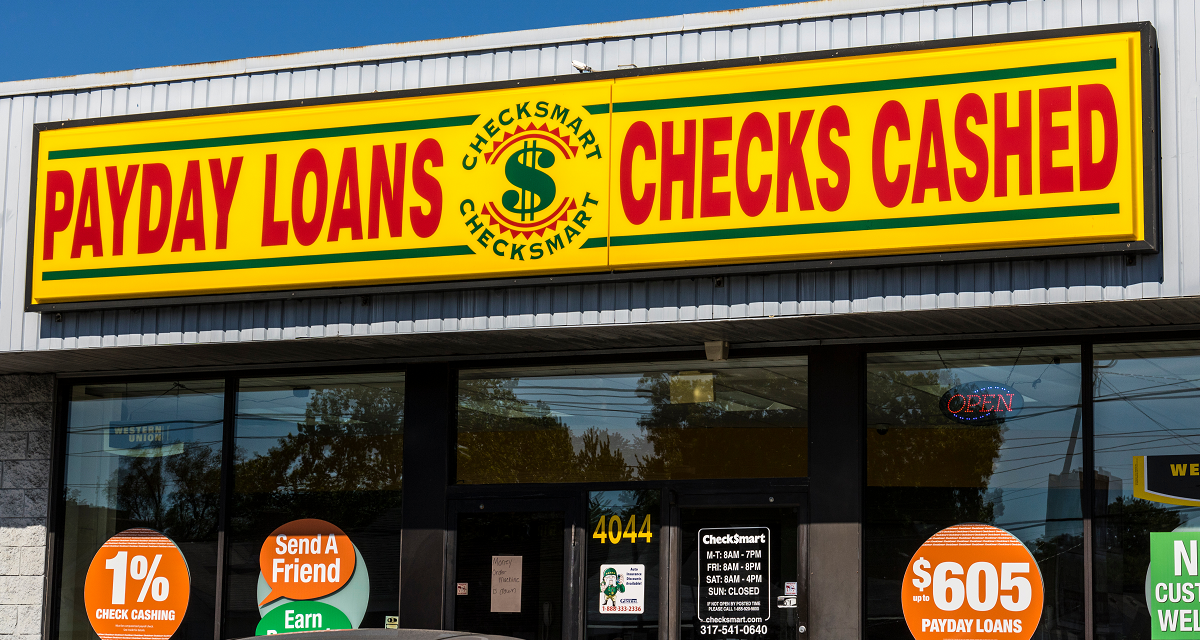Topeka Justice Unity & Ministry Project (JUMP) has a long history of advocating for payday loan reform, but they have faced significant pushback, especially from conservative legislators who refuse to prioritize the issue. Despite several attempts at reform proposals, the organization has faced its share of setbacks while the clock winds down. However, Kansans are speaking out loud and clear: the time to act is now.
Topeka JUMP is a nonprofit organization that pursues systematic change through policy and funding changes and provides a powerful vehicle for marginalized groups in Shawnee County, Kansas. They traditionally work with municipal and county-wide change, following a simple process of listening first, researching, organizing, and building relationships with local investors in their work.
While they’ve always felt that payday loan reform was a priority, they realized the challenges at the municipal and county level could be difficult to overcome. So, they built it into their strategic plan and focused on growing their organization and its people power. After hearing more and more stories about the people taken advantage of by misleading and predatory payday loans, the organization decided to shift its approach to the issue.
Topeka JUMP now serves as the anchor organization for a statewide coalition dedicated to helping Kansans affected by payday loans and protecting future borrowers. The Kansans for Payday Loan Reform Coalition is using the power of storytelling to underscore the importance of timely action on this issue. Payday loans in Kansas are currently unregulated and vulnerable people in desperate situations are paying the unreasonable price.
Campaign for Reform
To help relieve their communities from these predatory loans, the Kansans for Payday Loan Reform Coalition is proposing three major changes:
- A cap on interest rates.
- Regulation that allows for payment installments.
- A limited repayment amount.
Currently, interest rates in Kansas are not regulated, meaning businesses offering payday loans may charge any rate they please. According to Pew research, a major partner in this campaign, the average interest rate in Kansas is 391%. People who are already facing financial trouble and seek out a payday loan as a lifeboat are left drowning in debt, sometimes being asked to pay nearly four times what the original loan was worth. Capping interest rates alone is one regulation that would significantly lessen the burden for future borrowers.
Another regulation the Coalition is fighting for is the ability to set up a payment plan. Borrowers may be able to prove they have income that exceeds the loan amount, but this does not account for the cost of living. When payday comes and the loan is due in full, it is often impossible for borrowers to pay the entirety of the loan as well as keep up with rent, utilities, groceries, and other bills. Payment installments would provide borrowers a reasonable repayment option without being forced to take out a second loan or face added fees from lack of repayment.
Lastly, the Coalition is asking for a limited repayment amount. Capping this amount so it cannot exceed 5% of one’s paycheck helps keep the required repayment amount reasonable, especially combined with the other proposed changes.
A Cycle of Debt
According to Pew research, the majority of payday loans (69%) are used for recurring monthly expenses – including rent, utility bills, and food – with the second main reason (16%) being to cover an emergency or other unexpected cost. People trying to keep the lights on and food on the table are lured in by the promise of easy money fast, not foreseeing the problems that lie ahead. When their next payday comes, so does the bill for their payday loan. If they have yet to recover from their financial emergency, they either put off loan repayment (and incur ridiculous interest) or take out another loan, furthering the cycle.
Topeka JUMP executive director Shanae’ Calhoun believes there is a common misconception about who is impacted by the cycle of debt caused by payday loans which contributes to inaction. While many think this issue only affects people who don’t have income and are relying on loans with no intention or means to pay them back, the opposite is true. Payday loans require proof of income, specifically proof that an individual has the income to pay the loan back on their next payday, as well as proof of a bank account. Those affected are mainstream consumers and as the Coalition emphasizes, this can happen to anyone.
“Desperation is the number one characteristic,” Calhoun said. “The people who are most at risk are people who find themselves in a vulnerable and desperate situation that they weren’t prepared for. That literally means any one of us can be propelled to stop in a payday loan shop at a moment’s notice and I am one of those people.”
Calhoun’s personal experience with payday loans fuels her dedication to helping others escape the same cycle of debt she fell into. During a transition period between college and her first job, she took out a payday loan, wanting to pay her car note on time. However, while the nontraditional benefits of the payday loan were helpful in the moment, the payback timeline and interest rate were not.
For Calhoun and many others, payday loans offer a quick fix that seems too good to be true – because it is. Unlike traditional loans from a financial institution (like a bank or credit union), payday loans offer smaller dollar amounts, quicker timelines, lower initial borrowing fees, and other benefits. However, the loans must be paid back in full by the next payday, which simply isn’t realistic.
According to the Coalition, 170,000 Kansans use payday loans annually. The average borrower signs up for a two-week loan yet remains in debt for half a year after getting caught in this vicious cycle. Even Kansans who don’t personally borrow are affected as these loans are often given to out-of-state lenders, rather than reinvested into the Kansas economy. Regulating Kansas payday loans, even minimally, would save Kansans tens of millions of dollars each year.
The culprit at the heart of this issue is the misleading and predatory nature of the Kansas payday loan industry. The businesses offering these loans are, by definition, not “financial institutions.” This creates a loophole that essentially allows them free reign over their loan terms without being regulated under the same laws that banks and credit unions are bound by.
“It’s astounding that this industry is not just under-regulated – there is no cap on interest and fees,” said Steve Schiffelbein, a member of Mother Teresa Catholic Church who sits on the Topeka JUMP board of directors. “They could charge as much as they wanted to and would not be found breaking a law in the state of Kansas. That does not align with our values as a people – as Kansans, as people of faith, even as entrepreneurs or business owners. It doesn’t align with our values to take advantage of people like this industry is doing today.”
An Issue of Morality
The Kansans for Payday Loan Reform Coalition is strongly backed by the faith community, an endorsement demonstrated by its members of various faith-based groups across the state. However, conservative Kansas legislators who uplift shared values with these communities fall short when it comes to payday loan reform.
Reverend Sarah Marsh, coalition partner: The Mercy and Justice Team of the Great Plains Conference of the United Methodist Church, finds it “fascinating” how often she’s met politicians who speak of faith, yet continuously say that payday loan reform needs more time, more work, or simply isn’t at the top of their list. “It’s always a shock to hear something that seems such a simple thing that would help humans in our communities to just not be that important politically right now, to just be something that we’ll get to later,” she said.
Marsh believes this issue affects everyone, whether they realize it or not, because ultimately no one wants to see their family or friend be taken advantage of. “In a time where there’s so much that we culturally are polarized around, payday loan reform is one of those things that we can agree on that needs to happen,” she said. “That’s not a political issue, has nothing to do with partisan politics, and for that reason I am so hopeful about this campaign because I feel like it can be unifying.”
Though the faith community’s support of this initiative is strong, the payday loan lobby, currently, is unfortunately stronger. However, Schiffelbein, Marsh, and other local leaders are sure that morality will pull ahead. “Ultimately, a narrative that uplifts a moral economy and human dignity will win,” Schiffelbein said.
Share Your Story
Because of the “significant struggle between morality and money power,” as Calhoun puts it, it’s imperative that legislators feel public pressure to stop dragging their feet on this issue. Regardless of political party or affiliation, Kansas payday loan reform would undeniably help the people its legislators are supposed to serve.
To this point, the Coalition has included personal testimonies in its campaign, hoping to shed light on what it truly means for constituents to be facing a 391% interest rate when they are already financially vulnerable and get stuck in a cycle of debt. “Sometimes when the stakes are high, it’s important to put a face with a number,” said Calhoun. “We are talking about honoring people’s human dignity. That’s what makes the stories so real.”
The people being taken advantage of by these predatory loans include Kansans from all walks of life. Testimonies the campaign has gathered include the voices and stories of single parents, business owners, nonprofit boards, faith-based groups, the Office of the State Bank Commissioner, and more. People across both rural and urban areas are affected, and low-income and under-educated residents are especially targeted.
The Coalition urges Kansans to take action by sharing their story. “The human stories and human lives of Kansans are what this is really about,” said Marsh. “Numbers aren’t going to help us connect the way that stories do.”
Kansans can support this campaign by writing, calling, and meeting with their representatives and senators. The Coalition also offers a template to assist individuals with writing legislators, asking them to protect Kansas borrowers from predatory lending.
Individuals and organizations can also get in touch with the Coalition to learn more about upcoming events and meeting information, including a day of action on January 25, 2023 at the state Capitol.
To learn more about this issue and how to get involved, visit the Coalition website: https://kspaydayreform.wixsite.com/website
The Coalition’s Facebook page also offers more information and resources, including this testimony from Bishop Saenz.








